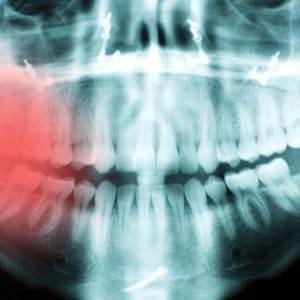The wisdom teeth are the very last teeth that erupt during our lifetime, usually appearing sometime between the ages of 18 and 25 although this can vary between patients. They are named wisdom teeth because of their late arrival, when we are older and supposedly wiser! Most people have
However, since they come through long after our other adult teeth, often patients find that there is simply not enough space left in the back of their mouths to accommodate them. This means that as they grow in, they can put pressure on other teeth, causing problems of overcrowding and misalignment that affect them too. In some instances, there may not be space for your wisdom teeth to erupt at all. When this happens, they are known as being ‘impacted’. A condition that is very painful and can lead to infection and other problems.
However, actually erupting and making space for them isn’t the only issue that surrounds the arrival of wisdom teeth. Food and bacteria can become trapped around the edges of wisdom teeth where they have erupted, and this can cause an accumulation of plaque that could lead to problems including:
- Dental Decay
- Pericoronitis: an infection of the soft tissue surrounding the affected tooth
- Cellulitis: a bacterial infection of the soft tissue surrounding the affected tooth
- Abscesses: a collections of pus in your wisdom tooth or the surrounding soft tissue which occurs as a result of bacterial infection
- Cysts: fluid-filled swellings
Signs that you are experiencing problems with your wisdom teeth
There are a variety of different symptoms that you might experience that would suggest that you have a problem with your wisdom teeth and would benefit from an appointment with your dentist. These include the following:
- Pain at the back of your mouth, behind your molars
- Swelling and tenderness around the wisdom teeth
- Pus or other discharge from around the affected tooth
- Persistent bad breath
- Foul taste when you chew your food
- Jaw and ear pain
- Warmth and redness in the jaw
If you are experiencing any of the symptoms listed above, you should arrange to see your dentist as soon as possible.
Do I have to have my wisdom teeth taken out?
There are some people who believe that everyone should have their wisdom teeth taken out. However, dentists agree that this is really only necessary if you experience recurrent problems with their eruption. It can take a number of months or even years for them to completely come through, and during this time someone who is having problem with their arrival may find that they go through multiple episodes of pain and infection. In these instances, your dentist may recommend that you consider extraction rather than prolonged periods of difficulty.
If you are concerned about whether or not your wisdom teeth need to be removed, don’t hesitate to speak to your dentist who will be able to advise you based upon your individual circumstances. In some cases, your professional may recommend that you have your wisdom teeth removed before they have an opportunity to cause you pain or debilitating symptoms. This is often the case for family dentists who suggest this to patients in their late teenage years if they recognize that there is unlikely to be enough space to accommodate their imminent wisdom teeth.
If you would like more information about when you should have your wisdom teeth removed, or if you would like to schedule a confidential consultation with our experienced dentistry team, please don’t hesitate to contact our offices. Call 480-443-3552 to speak with a Dental Rejuvenator staff member in Scottsdale, AZ today.

